
Anthropological Notebooks
metrics 2024
Fostering Interdisciplinary Dialogues in Anthropology
Introduction
Anthropological Notebooks, published by the SLOVENE ANTHROPOLOGICAL SOC, is a noteworthy journal within the field of anthropology. Established in Slovenia, this journal aims to provide a platform for scholarly dialogue and dissemination of anthropological research, fostering interdisciplinary approaches and global perspectives. Although it currently holds a Q4 quartile ranking in anthropology and ranks #421 out of 502 in Scopus, it serves as an essential conduit for emerging voices and innovative ideas in the discipline. Covering research published from 2010 to 2019 and from 2021 to 2024, the journal invites contributions that explore diverse cultural narratives and anthropological insights. Despite its limited open access options, Anthropological Notebooks remains a crucial resource for researchers, professionals, and students seeking to engage with contemporary anthropological discourse and enrich their understanding of human societies.
Metrics 2024
 0.11
0.11 0.40
0.40 0.60
0.60 16
16Metrics History
Rank 2024
Scopus
IF (Web Of Science)
JCI (Web Of Science)
Quartile History
Similar Journals
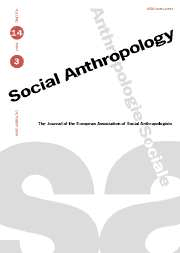
Social Anthropology
Advancing Knowledge in Sociocultural DynamicsSocial Anthropology is a leading journal published by BERGHAHN JOURNALS, focusing on the diverse and dynamic field of anthropology. With an ISSN of 0964-0282 and an E-ISSN of 1469-8676, this open-access journal has been a cornerstone of scholarly communication since its inception in 1982, becoming fully accessible to the public since 2022. Situated in the United States, the journal aims to disseminate high-quality research that explores sociocultural dimensions of human behavior across various contexts, addressing pressing contemporary issues through a multidisciplinary lens. With impressive rankings, including Q2 in Anthropology and Arts and Humanities, and strong positions in Sociology and Developmental Psychology according to Scopus metrics, Social Anthropology serves as an essential platform for researchers, professionals, and students committed to advancing our understanding of social practices and cultural norms. Its commitment to fostering intellectual discourse makes it a vital resource for those seeking to deepen their knowledge and insight into the anthropological landscape.

Chungara-Revista de Antropologia Chilena
Empowering Scholars to Share Anthropological DiscoveriesChungara-Revista de Antropologia Chilena is a premier academic journal dedicated to the field of anthropology, showcasing research and discourse that emphasize the rich cultural heritage of Chile and its surrounding regions. Published by UNIV TARAPACA, this journal serves as a vital platform for scholars, researchers, and students keen on exploring anthropological studies, ethnographic fieldwork, and cultural analysis. With an ISSN of 0717-7356, it adheres to rigorous academic standards and strives to promote open dialogue on contemporary and historical issues across various communities. Although currently not indexed in prominent metrics, its commitment to scholarly excellence contributes significantly to the academic landscape, fostering a deeper understanding of anthropological practices in Chile and beyond. Authors are encouraged to engage with the journal's rich repository of knowledge while readers gain access to pivotal insights that drive forward the discourse within anthropology.

Anthropology of Work Review
Illuminating the Anthropology of WorkAnthropology of Work Review is a prestigious academic journal published by WILEY, dedicated to the exploration of the intricate relationships between work and culture. With its ISSN 0883-024X and E-ISSN 1548-1417, this journal has established itself as a leading voice in the field, achieving a remarkable Q1 ranking in Anthropology for 2023 and positioning itself favorably at #136 out of 502 in Scopus rankings within the Social Sciences category. Since its inception in 1980, the journal has continued to publish innovative research that examines the anthropological dimensions of work across diverse contexts and cultures. Although it does not currently offer open access, the journal remains a vital resource for researchers, professionals, and students interested in the latest findings and discussions within the anthropology of work. The journal’s commitment to fostering a deeper understanding of how work shapes and is shaped by human society makes it an invaluable asset for anyone engaged in anthropology and related disciplines.
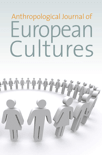
Anthropological Journal of European Cultures
Decoding the Complexity of European CulturesAnthropological Journal of European Cultures, published by BERGHAHN JOURNALS, is a premier Open Access journal dedicated to the exploration and analysis of cultural dynamics within European societies. With an ISSN of 1755-2923 and an E-ISSN of 1755-2931, the journal has been providing a platform for critical discourse in anthropology and cultural studies since its inception in 2008. Catering to a diverse readership of researchers, professionals, and students, the journal plays a vital role in fostering a deeper understanding of European cultures through rigorous scholarship. It has garnered commendable rankings, including Q3 in Anthropology and Q2 in Cultural Studies for 2023, reflecting its growing influence and quality within the academic community. The journal is committed to Open Access since 2020, ensuring that cutting-edge research is freely available to all, thereby enhancing its reach and impact in the global discourse on culture and anthropology. With its comprehensive and interdisciplinary approach, the *Anthropological Journal of European Cultures* serves as an essential resource for advancing knowledge and promoting dialogue in these dynamic fields.
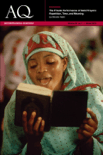
ANTHROPOLOGICAL QUARTERLY
Shaping the Future of Anthropological DiscourseANTHROPOLOGICAL QUARTERLY, published by the George Washington University Institute of Ethnographic Research, stands as a vital resource in the field of anthropology and broader arts and humanities studies. With an ISSN of 0003-5491 and an E-ISSN of 1534-1518, this esteemed journal has been contributing to academic discourse since its establishment in 1981. The journal holds a respected position in both the Q2 category for Anthropology and the Q2 category for Arts and Humanities (miscellaneous), demonstrating its impact and relevance, as evidenced by its rank of #152 out of 502 in the Social Sciences sector for anthropology and rank of #179 out of 552 in the Arts and Humanities field. Researchers, professionals, and students can rely on ANTHROPOLOGICAL QUARTERLY for rigorous peer-reviewed articles that push the boundaries of ethnographic research and anthropological theory, addressing contemporary issues with scholarly precision. The journal’s commitment to fostering critical analysis and interdisciplinary perspectives establishes it as an essential platform for advancing knowledge within its diverse and dynamic field.
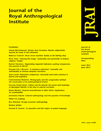
JOURNAL OF THE ROYAL ANTHROPOLOGICAL INSTITUTE
Elevating Research in the Study of HumanityJOURNAL OF THE ROYAL ANTHROPOLOGICAL INSTITUTE, published by Wiley, stands as a prestigious platform for scholarly discourse in the field of anthropology. With an ISSN of 1359-0987 and an E-ISSN of 1467-9655, this journal has been a vital resource for researchers, professionals, and students since its inception, featuring contributions that push the boundaries of understanding in both cultural and social anthropology. The journal’s rigorous peer-review process affirms its high academic standards, reflected in its top-tier Q1 rankings in both the Anthropology and Arts and Humanities categories for 2023. With a current ranking of #78 out of 502 in Social Sciences Anthropology and #138 out of 552 in Miscellaneous Arts and Humanities, it inhabits a critical space within academia, addressing seminal issues and innovative research. While the journal is not open access, it remains accessible to those affiliated with institutions that provide subscriptions, ensuring that groundbreaking anthropological insights are disseminated widely within the academic community. As it converges from 1995 to the present, the JOURNAL OF THE ROYAL ANTHROPOLOGICAL INSTITUTE continues to shape the landscape of anthropological research, engaging a diverse readership eager to explore the intricate tapestry of human cultures.
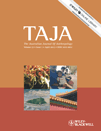
Australian Journal of Anthropology
Connecting Scholars, Enriching AnthropologyThe Australian Journal of Anthropology, published by Wiley, stands as a pivotal resource in the field of anthropology, reflecting a deep commitment to advancing scholarly discourse since its inception in 1990. With an ISSN of 1035-8811 and E-ISSN 1757-6547, this journal provides a platform for innovative research and critical analysis, contributing to the global anthropology community. Based in the United States, at 111 River St, Hoboken, NJ, it has established itself in the Q3 category of anthropology journals, ranking #162 out of 502 in Scopus, placing it in the 67th percentile among its peers. While it is not currently an open-access publication, the journal remains dedicated to accessibility through institutional subscriptions and provides a wealth of insight into anthropological methods and cultural studies. It seeks to foster interdisciplinary dialogue and promote a comprehensive understanding of social dynamics, making it an essential read for researchers, professionals, and students eager to enrich their knowledge and engage with contemporary anthropological issues.

AMERICAN JOURNAL OF PHYSICAL ANTHROPOLOGY
Bridging Disciplines in the Study of HumanityAMERICAN JOURNAL OF PHYSICAL ANTHROPOLOGY, published by Wiley, has established itself as a leading platform in the field of physical anthropology since its inception in 1918. This esteemed journal, identifiable by its ISSN 0002-9483 and E-ISSN 1096-8644, has been instrumental in disseminating groundbreaking research, achieving impressive rankings in both Social Sciences (Rank #18/443, 96th percentile) and Medicine (Rank #9/44, 80th percentile) categories within Scopus. Although its coverage in Scopus has concluded as of 2021, the journal continues to be a vital resource for academics and professionals seeking to explore the biological aspects of human evolution and variation. With a commitment to high-quality, peer-reviewed publications, the journal supports open access to enhance the visibility and accessibility of anthropological research globally. Researchers, students, and professionals are encouraged to engage with the innovative findings published in this journal, contributing to the ongoing dialogue in physical anthropology.
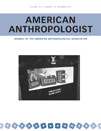
AMERICAN ANTHROPOLOGIST
Shaping the future of anthropology with impactful scholarship.American Anthropologist is a prestigious journal published by Wiley, dedicated to advancing the field of anthropology. With a rich publishing history dating back to 1888, it has become a leading platform for scholarly discourse, showcasing innovative research and diverse perspectives from around the globe. The journal holds impressive ranks within its categories, being recognized as Q1 in both Anthropology and Arts and Humanities, alongside a notable Scopus ranking of #36 out of 502 in Social Sciences. Its robust impact in academia is reflected in its emphasis on interdisciplinary approaches that resonate within the fields of social science and humanities. Researchers and students alike are encouraged to contribute to this vital resource that continues to shape anthropological thought and practice. For those interested, the journal is tailored for non-open access, ensuring the curation of high-caliber scholarly work accessible to a wide audience while supporting the standards of peer-reviewed publications.

Social Analysis
Bridging Anthropology, Culture, and SocietySocial Analysis, an esteemed academic journal published by BERGHAHN JOURNALS, is at the forefront of interdisciplinary research, focusing on the dynamic intersections of anthropology, cultural studies, sociology, and the arts and humanities. Since its inception in 2002 and having transitioned to an Open Access model in 2020, the journal ensures that critical social research is widely accessible to scholars and the public alike. With an impressive Q1 ranking in Anthropology and cultural studies and holding a notable Q2 in Sociology and Political Science, it garners attention from a large academic audience, as evidenced by its high Scopus rankings: 10th in general arts and humanities and 153rd in cultural studies. This signifies its influential role in shaping contemporary discourse and providing a platform for innovative ideas and methodologies in understanding social phenomena. Based in Brooklyn, NY, the journal is dedicated to fostering scholarly dialogue and advancing the field, making it an essential resource for researchers, professionals, and students eager to engage with and contribute to the field of social analysis.